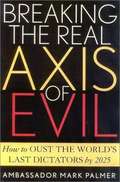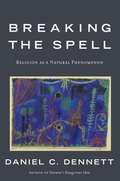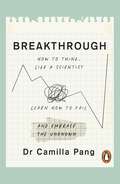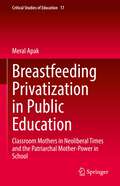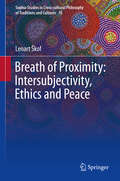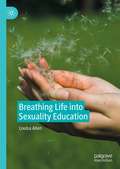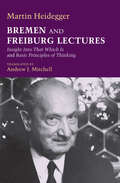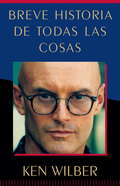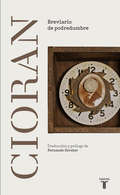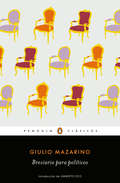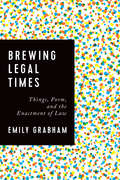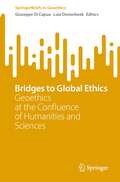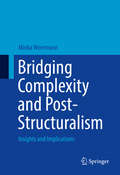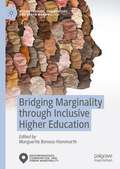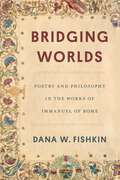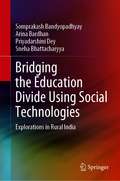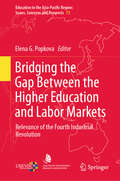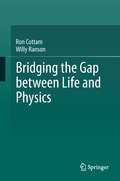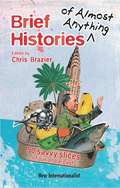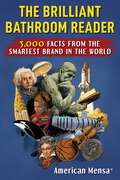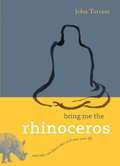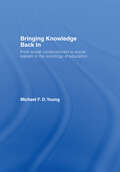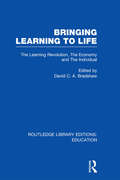- Table View
- List View
Breaking the Real Axis of Evil: How to Oust the World's Last Dictators by 2025
by Mark PalmerIn this book the author argues what diplomats and political leaders dare not speak: that global peace will not be achieved until democracies replace the world's remaining dictatorships.
Breaking the Spell
by Daniel C. DennettFew forces in the world are as potent as religion: it comforts people in their suffering and inspires them to both magnificent and terrible deeds. In this provocative and timely book, Daniel C. Dennett seeks to uncover the origins of religion and discusses how and why different faiths have shaped so many lives, whether religion is an addiction or a genuine human need, and even whether it is good for our health. Arguing passionately for the need to understand this multifaceted phenomenon, Breaking the Spell offers a truly original - and comprehensive - explanation for faith.
Breaking the Spell: Religion as a Natural Phenomenon
by Daniel C. DennettFor all the thousands of books that have been written about religion, few until this one have attempted to examine it scientifically: to ask why-and how-it has shaped so many lives so strongly. Is religion a product of blind evolutionary instinct or rational choice? Is it truly the best way to live a moral life? Ranging through biology, history, and psychology, Daniel C. Dennett charts religion's evolution from "wild" folk belief to "domesticated" dogma. Not an antireligious screed but an unblinking look beneath the veil of orthodoxy, Breaking the Spell will be read and debated by believers and skeptics alike.
Breakthrough: What can we learn about the world and ourselves if we think like scientists?
by Camilla PangFROM THE AWARD-WINNING AUTHOR OF EXPLAINING HUMANS'A wondrous hymn to the scientific method, and some of its most profound discoveries, and what it can teach us all about how to live better and richer lives' Prof. Lewis Dartnell, author of BEING HUMAN: How our Biology shaped World HistoryA scientist’s journey from observation to discovery is anything but straightforward.It is littered with failure, unexpected diversions and joyous realizations. Science helps us to understand ourselves – but what we know about the world around us, what has already been explored and discovered, is only half of science’s story.Dr Camilla Pang will look at some of the biggest mysteries facing science today and how some of the best, most cutting-edge scientists can illuminate our own approaches to observation, hypothesis, exploration, troubleshooting and discovery in our own lives.
Breastfeeding Privatization in Public Education: Classroom Mothers in Neoliberal Times and the Patriarchal Mother-Power in School (Critical Studies of Education #17)
by Meral ApakThis book unveils women’s empowerment as mothers as a notion in the school system that reinforces patriarchy rather than weakening it. It discusses how empowerment is a contested notion, even though it is mostly praised in terms of women’s emancipation. This book explores the concept that although women are breastfeeding education as mothers in the neoliberal education system, they are not necessarily doing so as a self-sacrifice as one may generalize in the context of neoliberal economy. Instead, this book argues that women are doing this as a means of investment for gaining a sense of individual power, which ironically, reinforces patriarchal values. It presents demonstrative and descriptive practical incidences in the field.
Breath of Proximity: Intersubjectivity, Ethics And Peace (Sophia Studies in Cross-cultural Philosophy of Traditions and Cultures #10)
by Lenart ŠkofThis book offers an original contribution towards a new theory of intersubjectivity which places ethics of breath, hospitality and non-violence in the forefront. Emphasizing Indian philosophy and religion (Vedas and Upanishads) and related cross-cultural interpretations, it provides new intercultural interpretations of key Western concepts which traditionally were developed and followed in the vein of re-conceptualizations or revitalizations of Greek thought, as in Nietzsche and Heidegger, for example. The significance of the book lies in its establishment of a new platform for thinking philosophically about intersubjectivity, so as to nudge contemporary philosophy towards a more sensitive approach, which is needed in our times. Its originality lies in its innovative approach, which searches for the origin of ethical gestures (represented in respecting the breath/breathing) through the newly introduced concept of "mesocosm" as a space of a ritual, or a new ethical space of intersubjective encounters. The book also introduces the possibility of an original ethics based on breath. Intended for philosophers, feminists and others concerned with intercultural philosophy and comparative religion, the book will appeal to readers interested in contemporary ethical and political theories of peaceful conflict resolution and concepts of hospitality. A Breath of Hospitality will benefit all who seek a more sensitive approach in philosophy, including philosophy of religion, and often-neglected practical and educational layers of our everyday intersubjective relations.
Breathing Life into Sexuality Education
by Louisa AllenThis book seeks to re-envision the purpose and pedagogy of sexuality education, disrupting its conventional instrumental and health related aims. Predominately theoretical in nature, it presses at the traditional limits of sexuality education’s thought by drawing together ideas from disparate disciplinary fields including education, geography, sound studies and new materialist theory. The philosophical thought of Sharon Todd provides an anchor throughout, and is employed to reconceptualize sexuality education as sensuous event. The author calls for a reframing of the relationship of education and ethics, and explores what this means for sexuality education classrooms and relationships between and amongst teachers and students. The book explores pedagogies that invite new forms of student sensibility and open possibilities for engagement in sexuality education in currently uncharted ways. It will appeal to students and experienced academics conducting research related to sexuality, education, educational philosophy, queer studies and new materialisms.
Bremen and Freiburg Lectures: Insight Into That Which Is and Basic Principles of Thinking (Studies in Continental Thought)
by Martin HeideggerThis volume presents two important lecture cycles delivered after WWII, exploring the poetry of Hölderlin and the nature of thought itself.Heidegger delivered his lecture series, Insight into That Which Is, at Bremen in 1949. It was his first speaking engagement after World War II, when he was officially banned from teaching. Here, Heidegger openly resumes thinking that deeply engaged him with Hölderlin’s poetry and themes developed in his earlier works.In the Freiburg lectures, delivered in 1957, Heidegger ponders thought itself and freely engages with the German idealists and Greek thinkers who had provoked him in the past. Andrew J. Mitchell’s translation allows English-speaking readers to explore important connections with Heidegger’s earlier works on language, logic, and reality.
Breve historia de todas las cosas
by Ken WilberBreve historia de todas las cosas es una excursión extraordinaria a través del Kosmos. En un viaje para cortar el aliento, desde el Big Bang hasta el mundo postmoderno en que vivimos, Ken Wilber analiza el universo y nuestro lugar en él -y nos brinda una crónica accesible y entretenida de cómo se entrelaza y funciona todo. Por el camino echa luz no sólo sobre las grandes preguntas cósmicas sino sobre diversos asuntos muy debatidos de nuestros días, como la ética ambiental, las relaciones de género, el multiculturalismo e incluso el sentido del Internet. En cada uno de estos terrenos hay patrones repetitivos que, si los examinamos con cuidado, pueden enseñarnos mucho acerca de los problemas de nuestro mundo, y en qué dirección debemos encaminarnos para que la transformación planetaria se vuelva realidad.A Brief History of Everything is an extraordinary ride through the Kosmos. In a breathtaking trip from the Big Bang to the Postmodern world we inhabit, Ken Wilber examines the universe and our place in it--and comes up with an accessible and entertaining account of how it all fits together. Along the way he sheds light not only on the great cosmic questions but on various contentious issues of our day, such as environmental ethics, gender relations, multiculturalism, and even the meaning of the Internet. In each of these domains, there are recurring patterns, and by looking closely at them, we can learn much about the predicament of our world--and the direction we must take if global transformation is to become a reality.
Breviario de podredumbre
by E. M. CioranUn autor de culto, un hallazgo decisivo para cualquier amante de las paradojas y la ironíaTaurus recupera Breviario de podredumbre, primer libro que Cioran escribió en francés y uno de los textos más representativos de su obra. Entre la resignación y la rabia, es un libro con propiedades tonificantes. Mientras que su repercusión inicial se limitó a un pequeño círculo de críticos, pronto pasó a convertirse en libro de culto y, finalmente, en uno de los más citados.«Expresión, reflexión, ironía: aquí está la obra de E. M. Cioran. [...] Pensador ahistórico, espléndidamente aislado, sin escuela ni progenie, la figura de E. M. Cioran aparece con creciente frecuencia en el mar de los sargazos de la cultura contemporánea: se repiten sus aforismos, para dar peso sentencioso a artículos periodísticos con pretensiones de sublimidad (peligro máximo de Cioran: lo fácil y brillantemente que se le puede citar). [...] Es miembro de la "sombra" de la filosofía oficial francesa de nuestros días; hacia esta sombra se van volviendo muchos ojos, fatigados del relumbrón de tantos alamares y charreteras.»Fernando Savater
Breviario para políticos
by Giulio MazarinoLos mejores libros jamás escritos. «Solo el azar determina las acciones de los hombres.» El cardenal Giulio Mazarino presenta en su Breviario para políticos una particular concepción sociopolítica de la época que le tocó vivir y eligió protagonizar. Desarrolla así, escueta y precisamente, un agudo análisis de la condición humana. A lo largo de sus páginas, se ofrecen al lector directrices y consejos de un pragmatismo atroz, lindante de la inmoralidad, cuyo único objetivo es la obtención de más y más poder. Inteligente, aguda y, por encima de todo, tremendamente sincera, la presente es una obra imprescindible para historiadores, para literatos y, por supuesto, para políticos. En la palpitante versión de María Pons Irazazábal, este lacerante epítome se revela no solo como el retrato de uno de los hombres más poderosos de su tiempo, sino, en palabras del maestro Umberto Eco, firmante de la introducción que abre el volumen, como «un retrato robot de uso diario, para vuestra actividad cotidiana».
Brewing Legal Times: Things, Form, and the Enactment of Law
by Emily GrabhamMuch socio-legal scholarship assumes that even if experiences of law and time differ, people and laws exist within an overarching, shared timeframe. In Brewing Legal Times, Emily Grabham boldly departs from this assumption, drawing on perspectives from actor-network theory, feminist theory, and legal anthropology to advance our understanding of law and time. Grabham argues that human, material, and legal relationships constantly generate new temporalities because of human and nonhuman interactions. By engaging with the creative potential of "things" such as cells, viruses, reports, legal documents, and more, our understanding of law and time is subject to change. In challenging the scholarship on the materiality of time and law, Brewing Legal Times encourages us to confront the multiple and mundane ways in which time is enacted through legal networks.
Bridges to Global Ethics: Geoethics at the Confluence of Humanities and Sciences (SpringerBriefs in Geoethics)
by Giuseppe Di Capua Luiz OosterbeekThis book contributes to the current discussion on geoethics and global ethics within the geoscience and humanities communities. It provides new content and insights into developing convergent human actions in response to global anthropogenic changes, based on perspectives that make it possible to combine geoscience knowledge with humanities and social sciences approaches. Selected authors present their reflections, findings and insights regarding the vision of geoethics (ethics of responsibility towards the Earth) as global ethics from philosophical, humanities and social sciences perspectives. In addition, they discuss ethical frameworks from diverse cultural traditions, searching for points of intersection with geoethics. The goal: for global environmental problems to be managed via multi-perspective approaches that can more effectively accommodate complexity. Combining the strengths of the geosciences, humanities and social sciences can pave the way for a paradigm shift in how human societies develop adaptive, sustainable responses to environmental changes and societal inequalities.
Bridging Complexity and Post-Structuralism: Insights and Implications
by Minka WoermannThis work addresses the topic of philosophical complexity, which shares certain assumptions with scientific complexity, cybernetics, and General Systems Theory, but which is also developing as a subject field in its own right. Specifically, the post-structural reading of philosophical complexity that was pioneered by the late Professor Paul Cilliers is further developed in this study. To this end, the ideas of a number of contemporary French post-structural theorists and their predecessors - including Derrida, Nancy, Bataille, Levinas, Foucault, Nietzsche, and Heidegger - are introduced. The implications that their various insights hold for our understanding of complex human systems are teased out at the hand of the themes of economy, (social) ontology, epistemology, and ethics. The analyses are also illuminated at the hand of the problematic of the foreigner and the related challenges of showing hospitality to foreigners. The study presents a sophisticated introduction to both philosophical complexity and to philosophies of difference. By relating these two subject fields, the study also expands on our understanding of philosophical complexity, and offers an original characterisation of the aforementioned philosophers as complex thinkers.
Bridging Marginality through Inclusive Higher Education (Neighborhoods, Communities, and Urban Marginality)
by Marguerite Bonous-HammarthThis book examines the changing influences of diversity in American higher education. The volume offers evidence and recommendations to positively shape inclusive learning and engagement of students, faculty, staff and community across the complex terrains of urban, suburban, and rural organizations within higher education today. Chapters highlight critical collaborations across student affairs and academic affairs, and delve into milestones addressing access, retention, engagement, and thriving within distinctive institutional types (e.g., research, liberal arts, community colleges, Minority Serving Institutions). Authors also explore the nuanced changes occurring against the contemporary backdrop of COVID-19 experiences – including the rise of anti-Asian racism, the salience of implicit biases, and the disparate access to and impacts of health services. Essential chapters refocus our consideration about the trajectories of historically underrepresented groups and their peers (including, African Americans, Hispanic/Latino, Indigenous people, individuals with disabilities and those identifying as LGBTQ+, undocumented students, and women) in American higher education.
Bridging Worlds: Poetry and Philosophy in the Works of Immanuel of Rome
by Dana W. FishkinMahberot Immanuel is a collection of twenty-eight chapters in Hebrew of rhymed prose and poetry written by the poet and amateur philosopher Immanuel of Rome during an era of rapid political change in late medieval Italy. The final chapter, Mahberet Ha-Tofet Ve-ha-‘Eden (A Tale of Heaven and Hell), like Dante’s Commedia, depicts Immanuel’s visits to hell and heaven. Bridging Worlds focuses on the interrelation of Immanuel’s belletristic work and biblical exegesis to advance a comprehensive and original reading of this final chapter. By reading Immanuel’s philosophical commentaries and literary works together, Dana Fishkin demonstrates that Immanuel’s narrative made complex philosophical ideas about the soul’s quest for immortality accessible to an educated populace. Throughout this work, she explains the many ways Mahberet Ha-Tofet Ve-ha-‘Eden serves as a site of cultural negotiation and translation. Bridging Worlds broadens our understanding of the tensions inherent in the world of late medieval Jewish people who were deeply enmeshed in Italian culture and literature, negotiating two cultures whose values may have overlapped but also sometimes clashed. Fishkin puts forth a valuable and refreshing perspective alongside previously unknown sources to breathe new life into this extremely rich and culturally valuable medieval work.
Bridging the Education Divide Using Social Technologies: Explorations in Rural India
by Somprakash Bandyopadhyay Sneha Bhattacharyya Arina Bardhan Priyadarshini DeyThis book explains the concept of education divide in rural India and identifies various factors that shape and sustain such a divide. In doing so, it also discusses a range of attempts undertaken to bridge the education divide. Subsequently, the book has attempted in providing a socio-technical framework towards optimally deploying social technologies for addressing the issue of education divide of marginalized communities. The proposed framework offers a transition from traditional content-centric, teacher-centric and centralized education ecosystem to a connection-centric, learner-centric and decentralized education ecosystem of the socio-digital age. It demonstrates how Internet-enabled digital platforms, based on the principles of sharism and mass collaboration using social technologies, could help to solve one of the greatest problems facing the world: mitigating the extant education divide by delivering quality education to underprivileged sections of society. The book also presents empirical validation of the proposed framework to show how a community-driven blended learning platform can mobilize the dormant knowledge capital of domain experts to teach underprivileged rural Indian children, as well as help form communities of practice to enable lifelong learning for the rural adult population. The book closes by pointing out the challenges involved in building an equitable education ecosystem using social technologies and ultimately the possibility of creating a fair and equitable society. Given its scope, the book offers a valuable resource for researchers, policymakers and practitioners in the domain of education who want to transform education ecosystems by using technological and process-related innovations to improve educational practices for underprivileged sections of society.
Bridging the Gap Between Aristotle’s Science and Ethics
by Henry, Devin and Nielsen, Karen Margrethe Devin Henry Karen Margrethe NielsenThis book consolidates emerging research on Aristotle's science and ethics in order to explore the extent to which the concepts, methods, and practices he developed for scientific inquiry and explanation are used to investigate moral phenomena. Each chapter shows, in a different way, that Aristotle's ethics is much more like a science than it is typically represented. The upshot of this is twofold. First, uncovering the links between Aristotle's science and ethics promises to open up new and innovative directions for research into his moral philosophy. Second, showing why Aristotle thinks ethics can never be fully assimilated to the model of science will help shed new light on his views about the limits of science. The volume thus promises to make a significant contribution to our understanding of the epistemological, metaphysical, and psychological foundations of Aristotle's ethics.
Bridging the Gap Between the Higher Education and Labor Markets: Relevance of the Fourth Industrial Revolution (Education in the Asia-Pacific Region: Issues, Concerns and Prospects #73)
by Elena G. PopkovaThis book studies and resolves the challenge of bridging the gap between higher education and the labor market arising from the Fourth Industrial Revolution. It unfolds and elucidates the understudied and previously unknown social nature of Industry 4.0, characterized by workers’ dashed expectations regarding automation. Consequently, the book proposes a scientific-practical approach to social adaptation to Industry 4.0 through higher education. The novelty of this approach lies in the fact that, instead of passively waiting, workers engage in flexible adaptation to evolving labor market conditions, while universities demonstrate increased flexibility in managing and modernizing educational programs. The book presents a comprehensive set of prospective solutions to bridge the gap between higher education and the labor market, leveraging the unique technological possibilities of Industry 4.0. This book explains the essence and technological opportunities for overcoming the gap between higher education and the labor market in the context of the Fourth Industrial Revolution. It also delves into and extensively discusses international experiences (including the Kyrgyz Republic, the Eurasian Economic Union (EAEU), Peru, the Republic of South Africa, Arabian Peninsula Countries, and Russia) and prospects for overcoming the gap between higher education and labor market in the conditions of the Fourth Industrial Revolution, with particular attention to Central Asian countries.
Bridging the Gap between Life and Physics
by Ron Cottam Willy RansonThis is the only book which deals with the correlatory comparison between hierarchical living systems and inorganic physical ones. The culmination of the book is the proposition of research to discover and understand the natural underlying level of organization which produces the descriptive commonality of life and physics. Traditional science eliminates life from its purview by its rejection of interrelationships as a primary content of systems. The conventional procedure of science is that of reductionism, whereby complex systems are dismantled to characterize lower level components, but virtually no attention is given to how to rebuild those systems—the underlying assumption is that analysis and synthesis are symmetrical. This book fulfills two main coupled functions. Firstly, it details hierarchy as the major formulation of natural complex systems and investigates the fundamental character of natural hierarchy as a widely transferable ‘container’ of structure and/or function – and this in the case of the new development of a representational or model hierarchy. Secondly, it couples this hierarchical description to that of the electronic properties of semiconductors, as a well-modeled canonical example of physical properties. The central thesis is that these two descriptions are comparable, if care is taken to treat logical and epistemological aspects with prudence: a large part of the book is composed of just this aspect of care for grounding consistency. As such great attention is given to correct assessment of argumentative features which are otherwise presumed ‘known’ but which are usually left uncertain. Development of the ideas is always based on a relationship between entity or phenomenon and their associated ecosystems, and this applies equally well to the consequent derivations of consciousness and information.
Brief Histories of Almost Anything
by Chris BrazierHere are fifty concise, entertaining histories on a broad, eclectic range of ideas (borders, feminism), global issues (migration, world trade), commodities (bananas, jeans), regions (Africa, Ireland), and institutions (corporations, the World Bank).Lucid and irreverent, Brief Histories of Almost Anything challenges common perceptions associated with the subjects by going behind the facts. Each history has been selected from the New Internationalist magazine, a leading authority on alternative history and "Best International Coverage" winner in the Utne Reader Independent Press Awards.Edited by Chris Brazier, author of the best-selling No-Nonsense Guide to World History.
Brilliant Bathroom Reader (Mensa®): 5,000 Facts from the Smartest Brand in the World
by American MensaAmerican Mensa presents: The Brilliant Bathroom Reader—The ultimate book of 5,000 facts curated by the world's smartest brand. Perfect to expand any curious mind! Whether gearing up for a big trivia night or simply wanting to give your brain something interesting to think about, this big book of 5,000 facts from the smartest brand in the world fits the bill. These facts will make you think. They&’ll make you wonder. You may even want to research more about some of these topics. Most of all, you&’ll have a ton of fun learning about everything from Thomas Edison&’s attempts at mind reading to Dr. Lucy King&’s beehive fences that scare elephants from destroying farms. We cover as many topics as possible, including facts that got our attention while weeding out the stuff that made us yawn or go, &“Yeah, yeah, I&’ve heard that one a million times.&” Topics include: Flora, Fauna, and FungaScience and TechnologyWorld CultureHistory US PresidentsNational ParksArt, Fashion, and LiteratureArchitectureHealthComicsMusic and EntertainmentSports and LeisureBizarre but TrueThe Brilliant Bathroom Reader is the perfect gift for learning new and exciting facts whenever you have a spare moment or two.
Bring Me the Rhinoceros: And Other Zen Koans That Will Save Your Life
by John TarrantBring Me the Rhinoceros is an unusual guide to happiness and a can opener for your thinking. For fifteen hundred years, Zen koans have been passed down through generations of masters, usually in private encounters between teacher and student. This book deftly retells more than a dozen traditional koans, which are partly paradoxical questions dangerous to your beliefs and partly treasure boxes of ancient wisdom. Koans show that you don't have to impress people or change into an improved, more polished version of yourself. Instead you can find happiness by unbuilding, unmaking, throwing overboard, and generally subverting unhappiness. John Tarrant brings the heart of the koan tradition out into the open, reminding us that the old wisdom remains as vital as ever, a deep resource available to anyone in any place or time.
Bringing Knowledge Back In: From Social Constructivism to Social Realism in the Sociology of Education
by Michael Young'This book tackles some of the most important educational questions of the day... It is rare to find a book on education which is theoretically sophisticated and practically relevant: this book is.' From the Foreword by Hugh Lauder What is it in the twenty-first century that we want young people, and adults returning to study, to know? What is it about the kind of knowledge that people can acquire at school, college or university that distinguishes it from the knowledge that people acquire in their everyday lives everyday lives, at work, and in their families? Bringing Knowledge Back In draws on recent developments in the sociology of knowledge to propose answers to these key, but often overlooked, educational questions. Michael Young traces the changes in his own thinking about the question of knowledge in education since his earlier books Knowledge and Control and The Curriculum of the Future. He argues for the continuing relevance of the writings of Durkheim and Vygotsky and the unique importance of Basil Bernstein’s often under-appreciated work. He illustrates the importance of questions about knowledge by investigating the dilemmas faced by researchers and policy makers in a range of fields. He also considers the broader issue of the role of sociologists in relation to educational policy in the context of increasingly interventionist governments. In so doing, the book: provides conceptual tools for people to think and debate about knowledge and education in new ways provides clear expositions of difficult ideas at the interface of epistemology and the sociology of knowledge makes explicit links between theoretical issues and practical /policy questions offers a clear focus for the future development of the sociology of education as a key field within educational studies. This compelling and provocative book will be essential reading for anyone involved in research and debates about the curriculum as well as those with a specific interest in the sociology of education.
Bringing Learning to Life: The Learning Revolution, The Economy and the Individual (Routledge Library Editions: Education)
by David C BradshawIn an age of intense economic competition and continual change, the ability to learn is a key factor in survival and prosperity. This book examines the changing interaction of the world economy, Britain’s prospects for prosperity, the connections between different kinds of work and the learning that support them. Focusing on specific areas where changed attitudes and ways of working are long overdue, the authors show the need for a better balance between formal provision in schools, colleges and within employment, and less tangible informal learning at home and in the workplace. These, in turn, open up issues of the curriculum (especially in the formative later years in schools and colleges), guidance for education and work and the qualifications structure.
